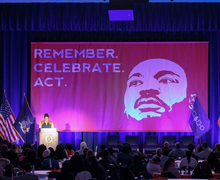Opposing political viewpoints should be welcomed at SU
/ The Daily Orange
Syracuse University’s March 2017 conference, “The Place of Religion in Film,” received negative attention last week for all the right reasons. Shedding light on the behind-the-scenes controversy within the festival planning, an article in The Atlantic on the change to the conference’s line-up sparked national and campus conversations about the true nature of free speech.
Invited by “Journal of Religion & Film” founder and University of Nebraska professor William Blizek, renowned filmmaker and New York University professor Shimon Dotan was slated to screen his film at SU’s conference. Dotan’s film “The Settlers” dives into the history of Israeli settlements on the West Bank.
There was a shakeup in festival planning when M. Gail Hamner, a Syracuse University religion professor, rescinded Dotan’s invitation to the conference. In her June email to Dotan, Hamner explained how colleagues on campus warned her that supporters of the anti-Israel Boycott, Divestment and Sanctions (BDS) movement would “make matters unpleasant” for Dotan if he attended. She also said a colleague told her she would “lose credibility” with peers in the film and screen studies as well as women’s and gender studies departments since she had not seen the film and could not vouch for it.
Dotan wrote back, according to The Atlantic, that he empathized with “the tough political spot” that Hamner felt she was in, and that “the forces that chill speech and action on college campuses are real” and not of Hamner’s making. Dotan’s statement touches on the important issue at hand: not so much administrative restrictions on free speech, but on a campus culture that discourages it.
Since the story had been picked up swiftly by outlets like The Huffington Post and The Chronicle of Higher Education, SU as an administration reacted almost immediately. By Friday, the university made the decision to reinvite Dotan. In her email announcement, SU Vice Chancellor and Provost Michele Wheatly said Hamner’s decision was not in line with SU’s “policies, ideals, and practices.”
With the question of supporting or not supporting Israel in particular, SU has visited this issue in the past. In 2014, then-Interim Chancellor and Provost Eric Spina offered an official statement on the American Studies Association’s decision to boycott Israeli academic institutions. Spina acknowledged that stances on Israel varied across the SU community and that he supported “the right of individual faculty members and others to express their thoughts and opinions on both sides of this issue.”
Spina went on to say that SU does not support the boycott of Israeli academic institutions and that moves such as this are “counter to the free and open exchange of knowledge, ideas and perspectives.”
Wheatly’s email sets the record straight again as to SU’s goals to be an institution of higher learning that protects and promotes free speech instead of stifles it. The “chilling” effect that Dotan mentioned is not the fault of the school’s administrative members, but the result of Hamner’s decision and the pressure she said she received from fellow faculty.
The fact that Hamner felt compelled to disinvite Dotan speaks to underlying factors: that there is a climate at SU where bringing a supposedly controversial speaker or piece of art to campus would end badly for all parties involved. That feeling of unease should be addressed by reaffirming that exploring different takes on conflict can only help SU’s students, faculty and staff grow intellectually.
With this specific instance of hindered speech, within the greater systemic issue at hand, the Dotan issue could have been partially resolved with SU conference organizers investigating the film before jumping to a decision. Dotan mentioned that he was puzzled as to why Hamner never asked for a copy of the film, as organizers checking out a piece before showing it is a common film festival practice. Hamner could have assuaged her colleagues’ fears the issue of vouching by pre-screening Dotan’s film and giving the respective departments her feedback or stamp of approval.
As the story continues to unfold, it should not be forgotten that colleges and universities should be environments where the expression of ideas should be welcomed. In this vein, the prospect of political dialogue and activism thereafter should be encouraged at SU, not shut down before it can start.
Published on September 6, 2016 at 12:05 am
Contact: opinion@dailyorange.com





